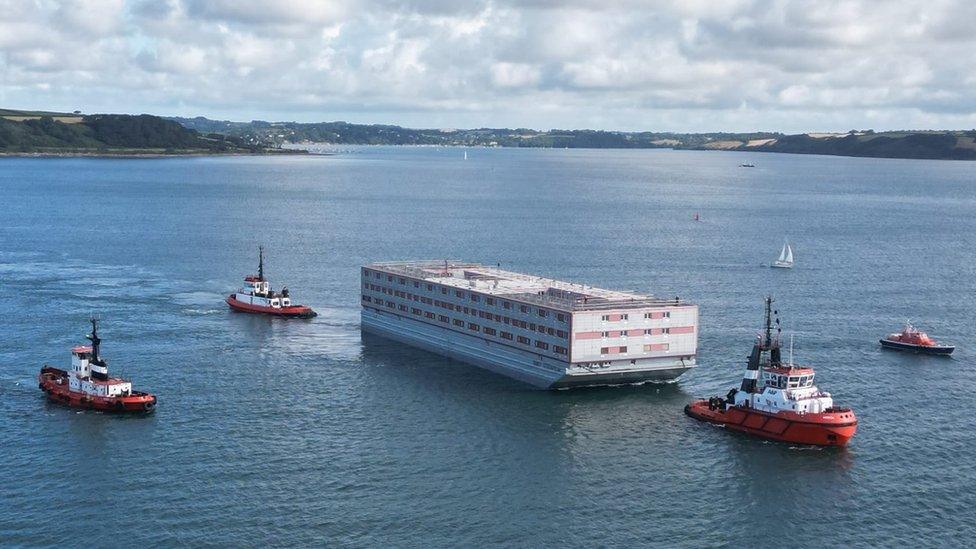Inside Bibby Stockholm: On board barge housing asylum seekers
- Published
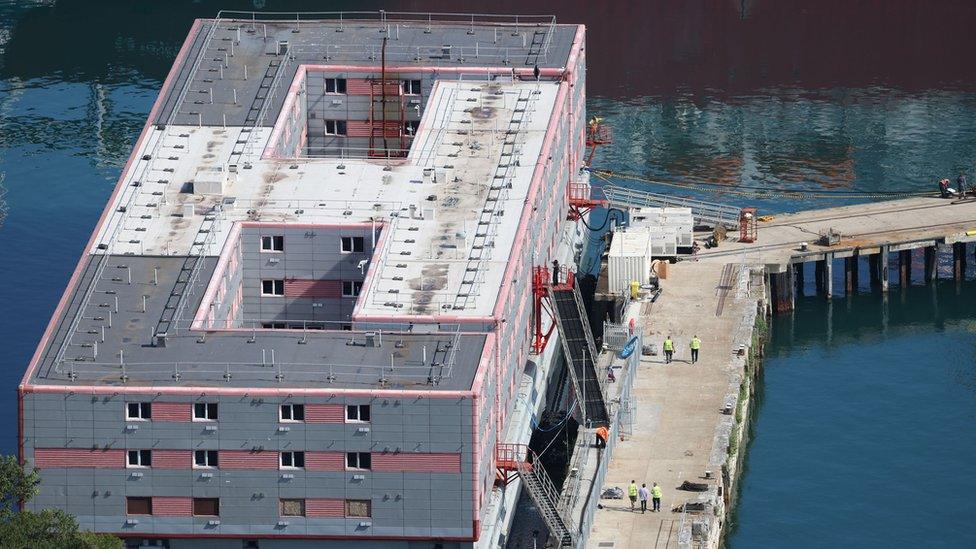
The government says housing asylum seekers in places like the Bibby Stockholm will help cut its £6m-a-day hotel bill
The first asylum seekers have arrived on board the accommodation barge, Bibby Stockholm, in Dorset.
Up to 500 men are to be housed on the three-storey vessel while they await the outcome of their asylum applications.
It is the first vessel secured under the Government's plans to reduce the cost of asylum accommodation.
Where is the Bibby Stockholm?
The barge is in Portland Port, on a scenic peninsula in south Dorset, a destination for cruise and cargo ships.
It is moored on the same spot as a prison ship, used to ease overcrowding for nine years until 2006.

How do local people feel?
There has been considerable local opposition to the plan, due to concerns about the asylum seekers' welfare, as well as the potential impact on local services.
But some residents have been determined to make the asylum-seekers welcome and have set up a local support group.
The first to arrive on board will receive "goody bags" made up of donations from local people and put together by volunteers from the group.
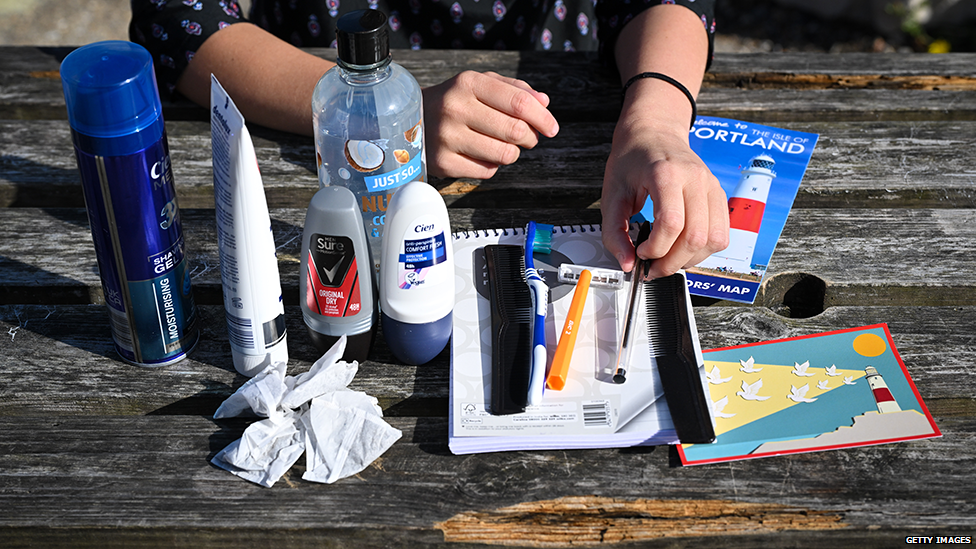
The bags will contain basic toiletries, as well as a local map, notebooks and pens. They also include a phone number for the support group.
What is it like inside?
Reporters were allowed to take a tour of the Bibby Stockholm, before the first occupants arrived.
It had the feel of an old overnight ferry or an outdated motel - a bit of a faded 1980s/90s vibe.
Long, confusing corridors lead to relatively spacious cabins which include a desk, wardrobe, safe locker, TV and large windows.

Each room has an en-suite bathroom with a shower and there are additional facilities on each of the three floors.
There were originally 222 cabins - but the main contribution to increasing its capacity from 222 to 506 has been placing bunk beds in each room.
They're not the biggest beds, but the rooms don't feel too claustrophobic.
There's a TV room with a big screen and sofas, a multi-faith prayer room and a classroom which can be used for meetings and activities.
Some other communal spaces have been converted to extra dormitory space for four to six men - but we weren't allowed to see these.
The dining room is large, with a long serving counter and tables of six set out in rows.
The sample menu includes eggs and pancakes for breakfast, potato soup and beef stew for dinner. We're told it will change regularly and cater for individual needs and religious requirements.
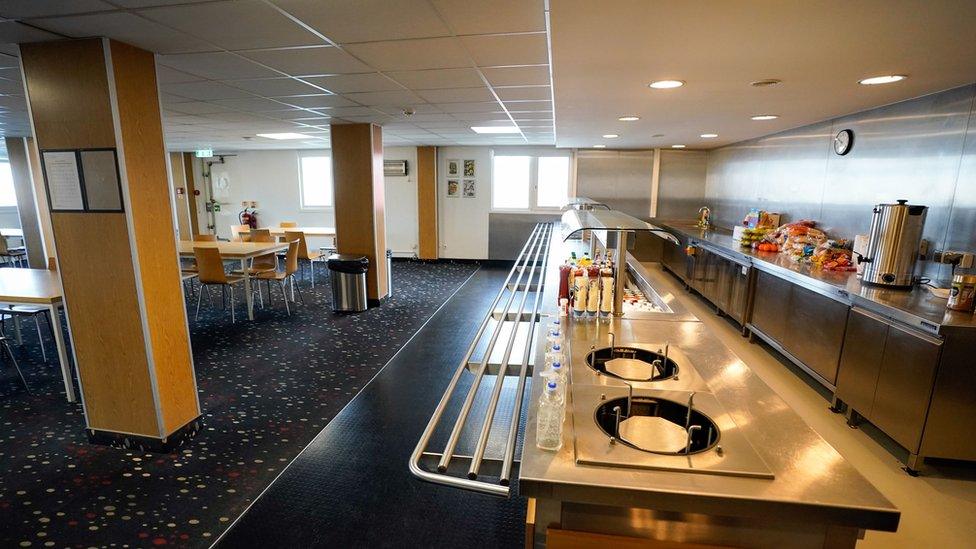
Will the occupants be allowed off the barge?
There's a gym and outdoor recreational space in the two courtyards in the centre of the barge. The men will also have access to the dockside, within a fenced off area - we're told this is to ensure the security of the port which also sees cruise ships, cargo vessels and navy craft docking.
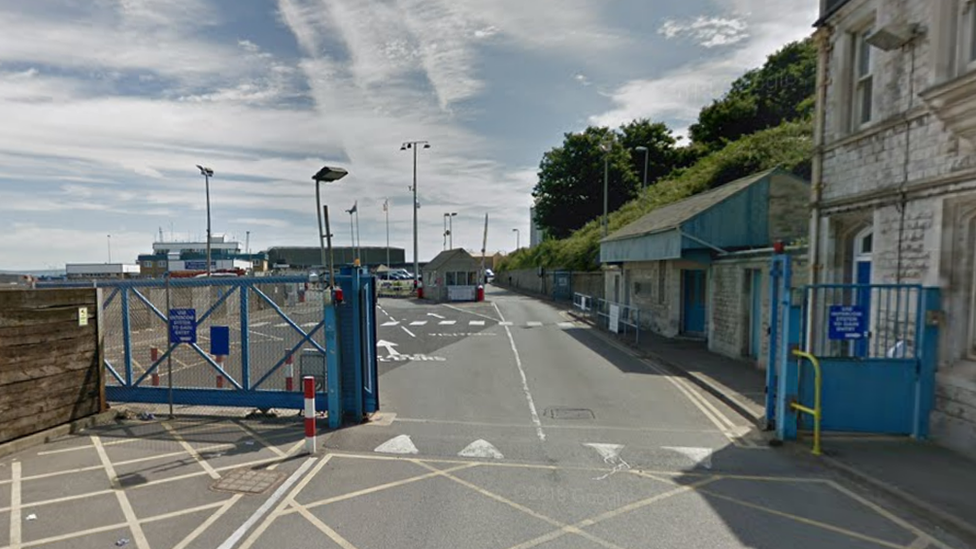
People will have to travel through a secure cordon to enter or leave the ship
There will also be 24/7 security in place on board and asylum-seekers will be issued with ID swipe cards and will have to pass through airport-style security scans to get on and off.
They will be expected to take a shuttle bus to the port exit for security reasons, and then encouraged to use the hourly buses, between 09:00 and 23:00, into Portland or Weymouth.
There is no curfew, but if they aren't back there will be a "welfare call" to check they're OK.
There will be excursions planned, as well as activities, such as sports, guided walks and trips to farms and even the opportunity to help on local allotments.
The men will receive healthcare on the barge or remotely, from a team of experts, following concerns among the local community over the impact extra people would have on local health services.
The government clearly wants to show that this accommodation isn't cruel or inhumane - but the Home Office has always described this as "basic and functional".
It certainly doesn't have ocean liner splendour - there's no grand staircase, fine artwork or sculpture. The stairwells feel quite industrial.
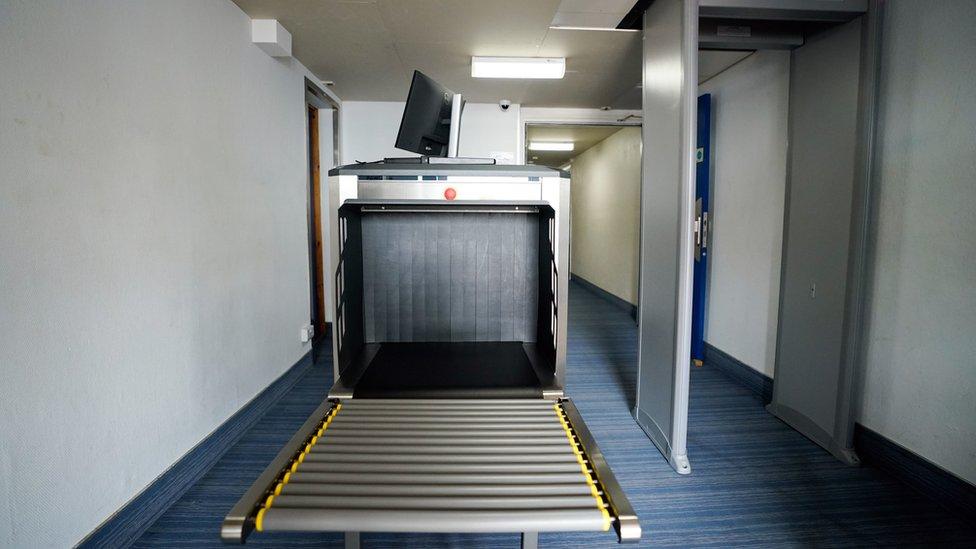
Security checks will be carried out on board the Bibby Stockholm
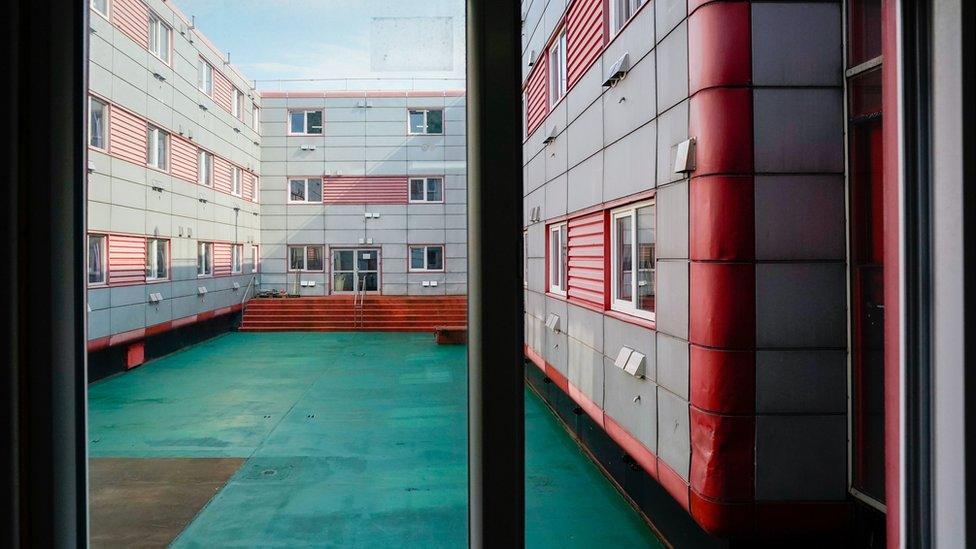
There are communal, outside areas on the barge
It is light, clean and currently seems reasonably comfortable.
Some of the journalists on our visit felt the standard is better than some of the hotels currently housing asylum seekers. Of course, our stay only lasted one hour.
Some men may be on board for nine months. And once it's full to capacity, conditions could feel very different.
What will it all cost?
The government says it is currently spending £6m per day housing more than 50,000 migrants in hotels.
The Home Office says that by the autumn, they aim to house about 3,000 asylum seekers in places that aren't hotels - such as the barge, and former military sites Wethersfield, in Essex, and Scampton, in Lincolnshire.
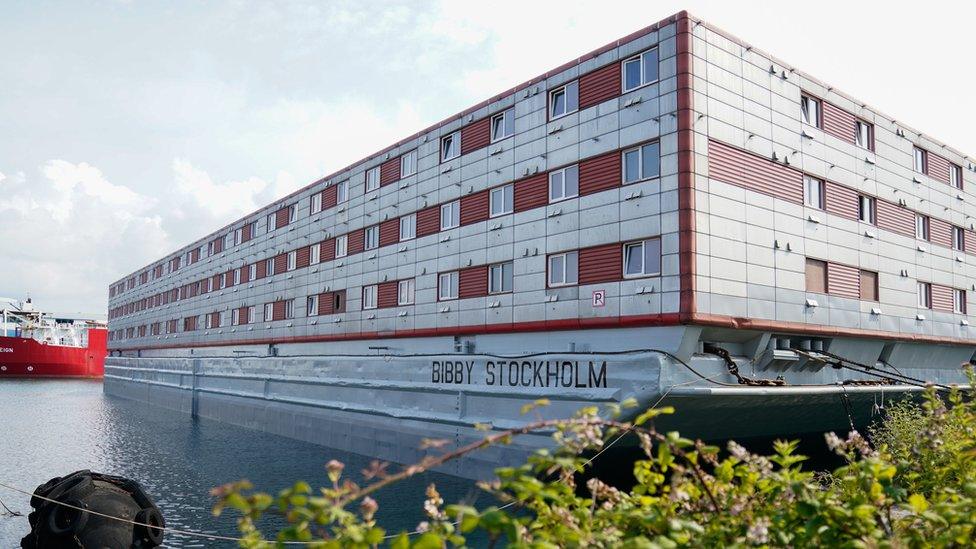
Immigration minister Robert Jenrick said the government had been "clear that those who arrive in the UK illegally should not be housed in expensive hotels".
"Our use of alternative accommodation sites and vessels provide basic and appropriate standards for small boats arrivals while their claims are determined," he said.
Dorset Council is receiving £3,500 per occupied bedspace on the Bibby Stockholm, with additional funding provided to the local NHS and police, the Home Office said.
The council has also received almost £380,000 in a one-off grant to help support local charity and voluntary organisations provide services on board, it is understood.
Related topics
- Published17 July 2023
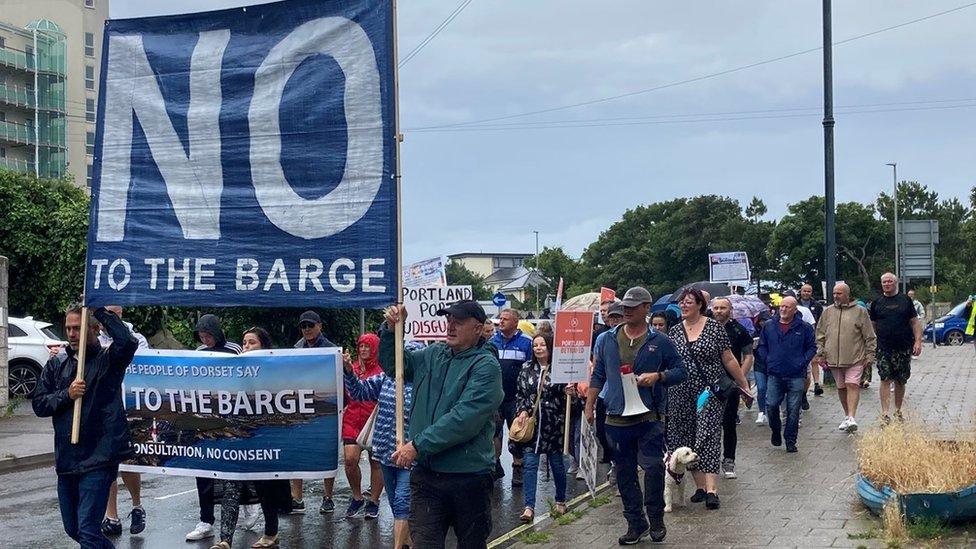
- Published21 July 2023
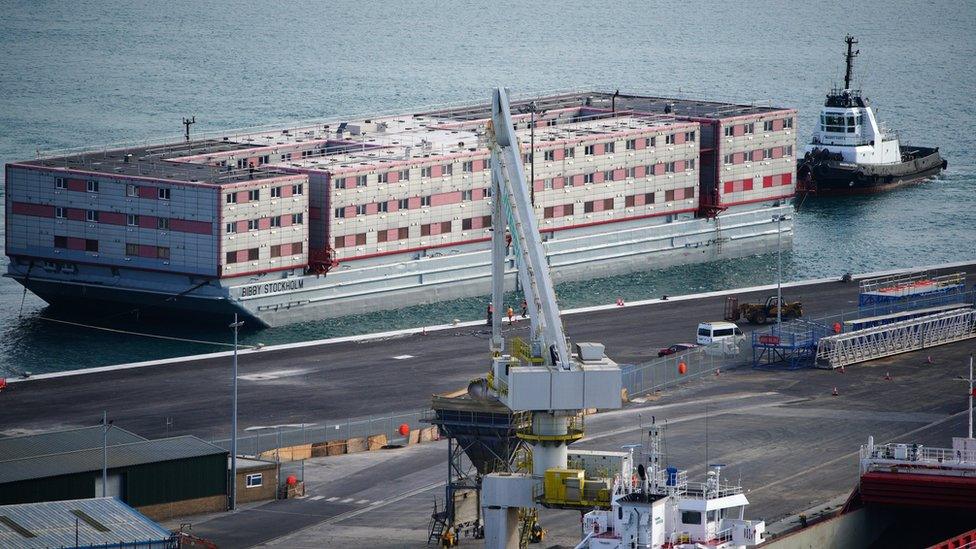
- Published17 July 2023
